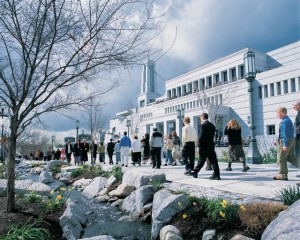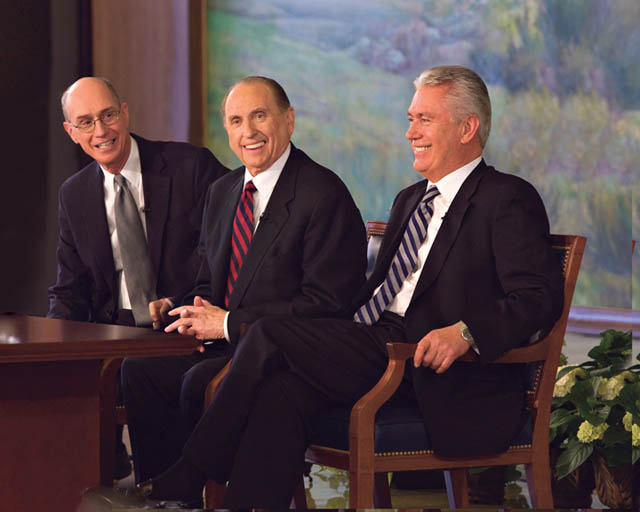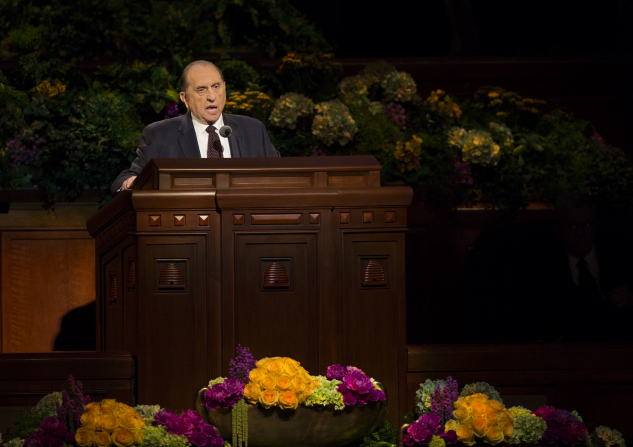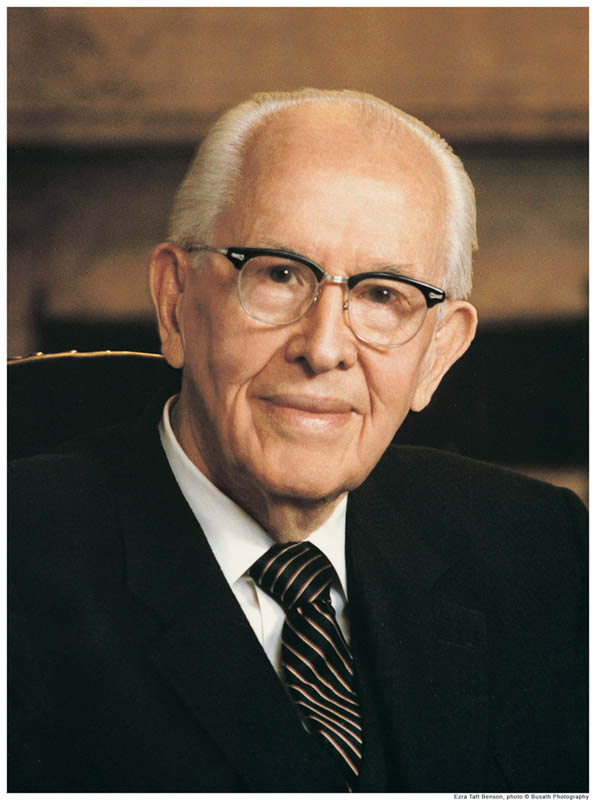General Conference is the name of a meeting held in Salt Lake City, Utah for all members of the Church of Jesus Christ of Latter-day Saints, whose members are often known as the Mormons. Held twice a year, in April and October, it is an opportunity for people world-wide to hear from the Mormon leaders. The meeting is broadcast over television, radio, satellite, and Internet, so anyone is welcome to watch the weekend-long proceedings, or to watch or read the proceedings later on the Internet.
General Conference begins, as do most Mormon meetings, with music and prayer. The music is provided by a choir. Some sessions have the Mormon Tabernacle Choir, the Mormon choir. Other sessions have choirs from various LDS schools or stakes (similar to a diocese.) Some choirs were put together just for conference. The prayer is given by a member of the church who is invited to do so.
Conference is conducted by a member of the First Presidency. The First Presidency consists of the Mormon prophet, who is also the president of the Church, and his two counselors. They are the highest ranking body of the church. The current prophet is Thomas S. Monson, who is best known for his long service to widows and his strong encouragement to care for the poor. He is noted as a skilled storyteller, whose stories always teach an important moral message. His personality is gentle and peaceful, as one might expect from someone with a long history of quiet service.
His First Counselor is Henry B. Eyring, who holds a doctorate from Harvard University, and who taught at Stanford University and headed an LDS university prior to becoming a General Authority (a high ranking church official).
The Second Counselor is Dieter F. Uchtdorf, born in Czechoslovakia. President Uchtdorf joined the Church as a child with his family and until his call to serve the Church, he was senior vice president of flight operations and chief pilot of Lufthansa German Airlines.
The Mormons do not attend a seminary and study for the ministry. Their leaders come from all walks of life and the bishops (similar to a pastor) and other local leaders all have full-time careers in addition to their pastoral work. Those who move to full-time Church service are chosen—you cannot volunteer to be a General Authority—and bring with them a wide range of experience from the wider world.
Speakers for the conference are chosen from the General Authorities and other high-ranking Church leaders. Among those speakers are the Mormon Apostles. Although they are the Quorum of Twelve Apostles, there are actually fifteen apostles, since the prophet and his counselors are also apostles. The Quorum of the Twelve serve as the second highest ranking body of the Church.
Additional speakers are usually chosen from among other General Authorities and other leaders. Most sessions include the Mormon women who lead the Relief Society auxiliary for women, the Young Women’s auxiliary for teenage girls, and the Primary organization for children.
Each speaker chooses his or her own topic and his own approach to it, praying to know what God wants them to discuss. As a result, there may be several talks on a given subject, but each from the perspective of the individual speaker. Listeners are encouraged to study the talks throughout the coming six months, to know the will of the Lord and to apply the messages to their own lives. The messages frequently include a range of topics on Christianity as it applies to everyday life.
Following are some excerpts from the October 2009 conference, offered to demonstrate some of the topics covered in a typical conference. A link is included to each talk so you can read it in its entirety.
Seeking to Know God and Jesus Christ
“Some wonder, why is belief in God so important? Why did the Savior say, “And this is life eternal, that they might know thee the only true God, and Jesus Christ, whom thou hast sent”?2
Without God, life would end at the grave and our mortal experiences would have no purpose. Growth and progress would be temporary, accomplishment without value, challenges without meaning. There would be no ultimate right and wrong and no moral responsibility to care for one another as fellow children of God. Indeed, without God, there would be no mortal or eternal life.
If you or someone you love is seeking purpose in life or a deeper conviction of God’s presence in our lives, I offer, as a friend and as an Apostle, my witness. He lives!
Some may ask, how can I know this for myself? We know He lives because we believe the testimonies of His ancient and living prophets, and we have felt God’s Spirit confirm that the testimonies of these prophets are true.”
Robert D. Hales, “Seeking to Know God, Our Heavenly Father, and His Son, Jesus Christ,” Ensign, Nov 2009, 29–32
Moral Discipline
Moral discipline is the consistent exercise of agency to choose the right because it is right, even when it is hard. It rejects the self-absorbed life in favor of developing character worthy of respect and true greatness through Christlike service (see Mark 10:42–45). The root of the word discipline is shared by the word disciple, suggesting to the mind the fact that conformity to the example and teachings of Jesus Christ is the ideal discipline that, coupled with His grace, forms a virtuous and morally excellent person.
Jesus’s own moral discipline was rooted in His discipleship to the Father. To His disciples He explained, “My meat is to do the will of him that sent me, and to finish his work” (John 4:34). By this same pattern, our moral discipline is rooted in loyalty and devotion to the Father and the Son. It is the gospel of Jesus Christ that provides the moral certainty upon which moral discipline rests.
D. Todd Christofferson, “Moral Discipline,” Ensign, Nov 2009, 105–8
How Mormonism Changes Africans
I have seen the good fruit of the gospel blossom in my home continent of Africa. After just 30 years, there are 300,000 Saints. In the doctrines and principles of the restored gospel, many are finding a sure anchor for their faith. Families uprooted from their rural communities in search of a better future in the towns and cities have found a new way to hold on to the strong family traditions which have come progressively under attack in this era of globalization. The Spirit of the Lord is moving powerfully among the people.
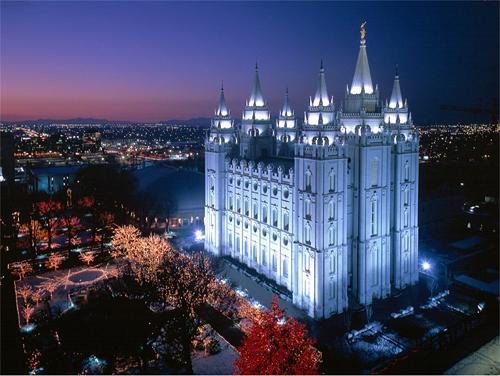 A new celestial culture is developing in homes, nurtured by the ready hearkening to the counsel of the living prophet to have daily prayer and scripture study and to meet once a week as a family in home evening. As a result, many are able to break free from the shackles of traditions that restrict the exercise of their agency.
A new celestial culture is developing in homes, nurtured by the ready hearkening to the counsel of the living prophet to have daily prayer and scripture study and to meet once a week as a family in home evening. As a result, many are able to break free from the shackles of traditions that restrict the exercise of their agency.
As an illustration from personal experience, three of our children were recently married in the temple without the encumbrance of dowry, a traditional practice that drives many young men and women to live together without any legal commitment to each other. The opportunity for a temple marriage in the three temples now established in Accra, Ghana; Aba, Nigeria; and Johannesburg, South Africa, is helping to instill a fresh hope in the sanctity of marriage.
Joseph W. Sitati, “Blessings of the Gospel Available to All,” Ensign, Nov 2009, 103–5
Twitter •


